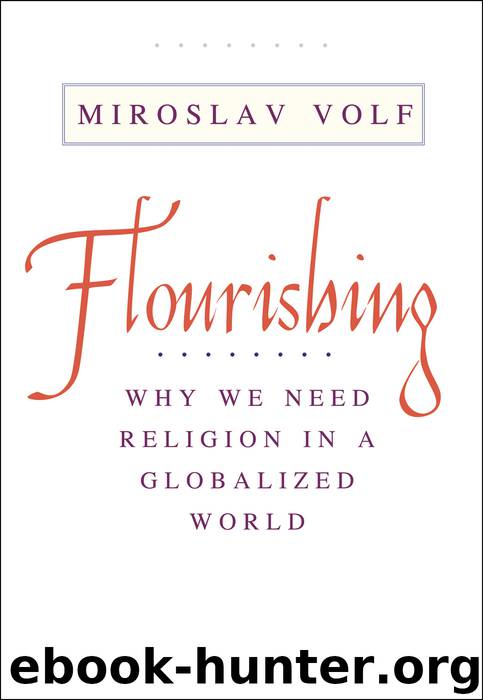Flourishing by Miroslav Volf

Author:Miroslav Volf
Language: eng
Format: epub
Publisher: Yale University Press
Published: 2015-04-07T16:00:00+00:00
The Christian Right and Political Pluralism
Williams’s religious struggle for political pluralism took place in the seventeenth century. But where are the religious exclusivists who embrace pluralism as a political project today? Travel with me forward in time over some 350 years from the early colonial period to contemporary America. In the second half of the twentieth century, conservative Christians, mainly Protestant fundamentalists and traditional Catholics, stepped with fierce determination onto the public scene in the United States. America had fallen under the dominance of a secular culture, they believed. It was important to realign it with its original purpose to be “a city upon a hill,” obeying divine laws rather than living by the permissive standards of secular morality. The movement, named the Christian Right, is made up predominantly of religious exclusivists.
Some have charged the Christian Right with compromising democratic values and wanting to turn the United States into a theocracy.42 Critics as well as supporters have characterized its leaders as the contemporary heirs to the theocratic John Winthrop.43 Yet on a closer inspection it turns out that the movement inherited much from Roger Williams as well. Christian Right leaders and activists are in fact an important contemporary example of religious exclusivists who embrace pluralism as a political project. My purpose here is not to evaluate the worth of the Christian Right’s substantive positions (on military interventions, abortion, euthanasia, gay rights, and so on); it is rather to show that they, religious exclusivists, promote these positions as political pluralists.
Just how much of Roger Williams is there in the Christian Right? In 2009, Jon Shields published a book, based on his doctoral dissertation, with a surprising title: The Democratic Virtues of the Christian Right. Shields was able to detect virtues where critics saw unmitigated vice by closely examining Christian Right organizations and studying “how the Christian Right leaders shape the public behavior of ordinary Christians.”44 The outside perception of the Christian Right becomes distorted in two principal ways, Shields argues. Critics mistakenly identify it with the militant fundamentalism of Randall Terry (Operation Rescue) or Jerry Falwell (Moral Majority). These figures, darlings of the media, were the Christian Right’s embarrassments, not its leaders. Moreover, critics evaluate the democratic character of the Christian Right by focusing on its policy ends. But policy issues are the matters of disagreement, the subject of political debates. The question here is how democratically virtuous is the Christian Right, and the primary way to determine this is to inquire about its “effects on participation and public debate.”45 So what are these effects?
First, many Christian Right organizations have helped “create more participatory democracy by successfully mobilizing conservative evangelicals, one of the most politically alienated constituencies in twentieth-century America.”46 More surprising and equally important as the Christian Right’s success in mobilization is its effect on public debate. Drawing on organizational materials and interviews with leaders in thirty different Christian Right organizations, Shields concluded that these leaders have inculcated “deliberative norms in their rank-and-file activists—especially the practice of civility and respect;
Download
This site does not store any files on its server. We only index and link to content provided by other sites. Please contact the content providers to delete copyright contents if any and email us, we'll remove relevant links or contents immediately.
| Buddhism | Christianity |
| Ethnic & Tribal | General |
| Hinduism | Islam |
| Judaism | New Age, Mythology & Occult |
| Religion, Politics & State |
Cecilia; Or, Memoirs of an Heiress — Volume 1 by Fanny Burney(32540)
Cecilia; Or, Memoirs of an Heiress — Volume 2 by Fanny Burney(31936)
Cecilia; Or, Memoirs of an Heiress — Volume 3 by Fanny Burney(31928)
The Secret History by Donna Tartt(19034)
Sapiens: A Brief History of Humankind by Yuval Noah Harari(14358)
Leonardo da Vinci by Walter Isaacson(13310)
The Radium Girls by Kate Moore(12013)
Sapiens by Yuval Noah Harari(5363)
How Democracies Die by Steven Levitsky & Daniel Ziblatt(5211)
The Wind in My Hair by Masih Alinejad(5085)
Homo Deus: A Brief History of Tomorrow by Yuval Noah Harari(4899)
Endurance: Shackleton's Incredible Voyage by Alfred Lansing(4761)
Man's Search for Meaning by Viktor Frankl(4573)
The Silk Roads by Peter Frankopan(4525)
Millionaire: The Philanderer, Gambler, and Duelist Who Invented Modern Finance by Janet Gleeson(4461)
The Rape of Nanking by Iris Chang(4200)
Joan of Arc by Mary Gordon(4098)
The Motorcycle Diaries by Ernesto Che Guevara(4087)
Stalin by Stephen Kotkin(3956)
